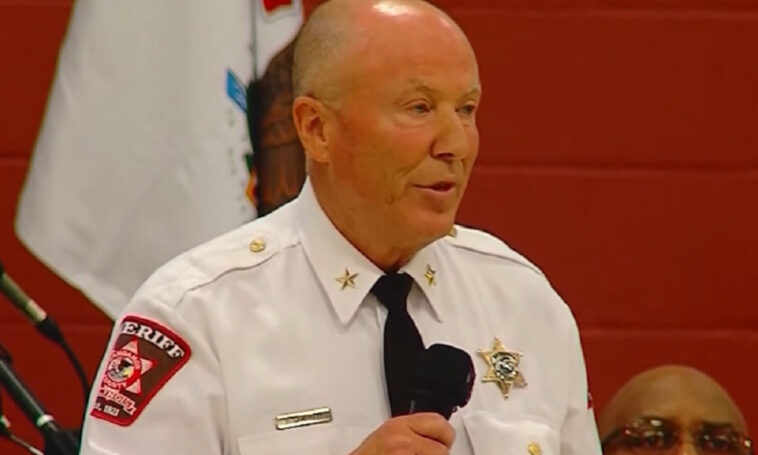The tragic story of Sonya Massey continues to unfold, casting a long shadow over the Sangamon County Sheriff’s Department. The spotlight is now firmly on Sheriff Jack Campbell, who recently announced his retirement just five weeks after Massey was fatally shot. This shocking event has not only raised questions about the circumstances surrounding Massey’s death but has also ignited a firestorm of controversy over the hiring practices within the sheriff’s department, particularly concerning former Deputy Sean P. Grayson, the officer charged with her murder.
Sonya Massey, a resident of Springfield, Illinois, lost her life on July 6, 2024, in what should have been the safety of her own home. The incident occurred after Massey dialed 911 to report a potential intruder. When Deputy Grayson arrived at the scene, what should have been a routine check quickly escalated into a deadly confrontation. Body camera footage, now widely circulated, captures the tense moments leading up to the tragedy. Grayson, who had been employed by the department for only a year, fired three shots at Massey, with one bullet tragically striking her just below her left eye.
This devastating incident has become a symbol of the ongoing issues of police brutality and the systemic failures within law enforcement that allow officers with troubling histories to continue serving. Grayson’s record is marred by numerous complaints of misconduct, two DUI convictions, and a questionable discharge from the Army. Despite these significant red flags, he was hired by Sheriff Campbell, only to be fired after being indicted on charges of first-degree murder, aggravated battery with a firearm, and official misconduct in connection with Massey’s death. The hiring and subsequent firing of Grayson have led to widespread outrage and demands for accountability.
Sheriff Jack Campbell, who has served the department for 30 years, initially resisted the growing calls for his resignation. However, as public pressure intensified, Campbell announced his decision to retire, citing the increasingly hostile political climate and threats to his family as reasons for stepping down. In a statement reported by the Associated Press, Campbell acknowledged the gravity of the situation, stating,
“We must honor the life of Sonya Massey by ensuring that no one else falls victim to such tragic and senseless action.”
His retirement, effective August 31, marks the end of a long career, but also raises questions about his role in Grayson’s hiring and the broader culture within the sheriff’s department.
The decision to retire came after mounting criticism from both the public and political leaders, including Illinois Governor JB Pritzker. The governor expressed his frustration with Campbell’s lack of transparency and his failure to provide satisfactory answers to the Massey family and the broader community. Pritzker’s demand for Campbell’s resignation underscores the severity of the situation and the need for significant changes within the department.
For the Massey family, the pain of their loss is compounded by the mishandling of the case and the continued presence of officers like Grayson within law enforcement. James Wilburn, Massey’s father, has been vocal in his criticism of Sheriff Campbell, calling him “an embarrassment” and joining others in demanding his resignation. The sheriff’s decisions, particularly regarding the hiring and firing of Grayson, have been widely condemned as indicative of deeper issues within the department.
In an attempt to address these concerns, Campbell’s office released Grayson’s personnel file and other relevant documents to the public, an effort to provide transparency that many view as too little, too late. The release of these documents did little to restore public trust, and the calls for comprehensive reforms within the department have only grown louder.
Civil rights attorney Ben Crump, who represents the Massey family, described Campbell’s retirement as a “turning point” for the community. Crump emphasized the family’s willingness to work with Campbell during his remaining time in office to help heal the community and seek justice for Sonya Massey. The family also hopes to collaborate with the next sheriff to ensure that such a tragedy “never happens again.”
As Sangamon County prepares for the transition to new leadership, the community is left to grapple with the systemic issues that allowed a deputy with Grayson’s background to be hired. The next sheriff will face the formidable task of implementing the necessary reforms to restore public confidence and prevent similar incidents in the future.
The legacy of Sonya Massey’s case will likely have a profound and lasting impact on law enforcement in Sangamon County. It serves as a stark reminder of the critical need for accountability, transparency, and meaningful reform in policing. As the community moves forward, the memory of Sonya Massey will continue to inspire the fight for justice and change in a system that has failed too many.



